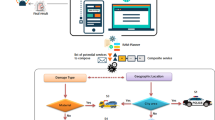Abstract
In pervasive systems, context is a direct cause to adapt the content of multimedia documents so that they comply, as far as possible, with the current constraints. In this respect, several adaptation approaches have already been proposed, in which adaptation services are often selected from shortlists of services. Practically speaking, adaptation services are provided in various instances and ways, thus making the selection task more difficult. Furthermore, existing approaches for the service selection paradigm cannot be properly applied mainly because constraints on execution time and the availability of computation resources must be considered. To deal with this issue, we propose a framework for adaptive service selection using a bag of metaheuristics ranging from local to global search methods. Depending on the contextual constraints, a sub-bag of algorithms is selected, for which the budget is distributed, using a reinforcement learning mechanism related to their performances. The proposal is validated through a set of experiments and comparisons. The obtained results are satisfactory and encouraging.



Similar content being viewed by others
Explore related subjects
Discover the latest articles, news and stories from top researchers in related subjects.References
Mahalle PN, Dhotre PS (2020) Context-Aware Pervasive Systems and Applications. Springer, New York
Jannach D, Leopold K (2007) Knowledge-based multimedia adaptation for ubiquitous multimedia consumption. J Netw Comput Appl 30(3):958–982
Hai QP, Laborie S, Roose P (2012) On-the-fly multimedia document adaptation architecture. Proc Comput Sci 10:1188–1193
Dromzée C, Laborie S, Roose P (2013) A semantic generic profile for multimedia document adaptation. Intelligent multimedia technologies for networking applications: techniques & tools, pp. 225–246
Alti A, Roose P, Laborie S (2017) Multimedia documents adaptation based on semantic multi-partite social context-aware networks. Int J Virt Commun Soc Netw (IJVCSN) 9(3):44–59
Saighi A, Philippe R, Ghoualmi N, Laborie S, Laboudi Z (2017) Hama: a handicap-based architecture for multimedia document adaptation. Int J Multimed Data Eng Manag 8(3):55–96
Khallouki H, Bahaj M (2017) Multimedia documents adaptive platform using multi-agent system and mobile ubiquitous environment. In: 2017 Intelligent Systems and Computer Vision, pp. 1–5. IEEE
Belhadad Y, Refoufi A, Roose P (2018) Spatial reasoning about multimedia document for a profile based adaptation. Multimed Tools Appl 77(23):30437–30474
Saighi A, Laboudi Z, Philippe R, Laborie S, Ghoualmi-Zine N (2020) On using multiple disabilities profiles to adapt multimedia documents: a novel graph-based method. Int J Inform Technol Web Eng 15(3):34–60
Alti A, Laborie S, Roose P (2017) Enrich the Expressiveness of multimedia document adaptation processes. In: Spyrou E, Lakovidis D, Mylonas P (eds.) Semantic multimedia analysis and processing, pp. 185–217, CRC Press
https://cloud.google.com/solutions/media-entertainment
https://aws.amazon.com/fr/media-services/
Da K, Dalmau M, Roose P (2014) Kalimucho: middleware for mobile applications. In: Proceedings of the 29th Annual ACM Symposium on Applied Computing, pp. 413–419
She Q, Wei X, Nie G, Chen D (2019) QoS-aware cloud service composition: a systematic mapping study from the perspective of computational intelligence. Exp Syst Appl 138
Zhao X, Li R, Zuo X (2019) Advances on QoS-aware web service selection and composition with nature-inspired computing. CAAI Trans Intell Technol 4(3):159–174
Wang S, Zhou A, Bao R, Chou W, Yau SS (2018) Towards green service composition approach in the cloud. IEEE Trans Serv Comput 99:1–14
Naseri A, Navimipour JN (2019) A new agent-based method for QoS-aware cloud service composition using particle swarm optimization algorithm. J Ambient Intell Human Comput 10:1851–1864
Li C, Li J, Chen H (2020) A metaheuristic-based approach for Qos-aware service composition. IEEE Access 8:69579–69592
Li Y, Yao X, Liu M (2019) Cloud manufacturing service composition optimization with improved genetic algorithm. Math Probl Eng vol. 2019, Article ID 7194258
Ramírez A, Parejo JA, Romero JR, Segura S, Ruiz-Ruiz-Cortés A (2017) Evolutionary composition of QoS-aware web services: a many-objective perspective. Exp Syst Appl 72:357–370
Thangaraj P, Balasubramanie P (2020) Meta heuristic QoS based service composition for service computing. J Ambient Intell Human Comput
Yuan Y, Zhang W, Zhang X, Zhai H (2019) Dynamic service selection based on adaptive global QoS constraints decomposition. Symmetry 11(3):403
Le DN, Nguyen GN (2015) A new ant-based approach for optimal service selection with e2e qos constraints. In: International conference on soft computing, intelligence systems, and information technology. pp. 98–109. Springer
Laboudi Z, Chikhi S (2012) Comparison of genetic algorithm and quantum genetic algorithm. Int Arab J Inf Technol 9(3):243–249
Chen Y, Yan J, Feng J, Sareh P (2021) Particle Swarm Optimization-based metaheuristic design generation of non-trivial flat-foldable origami tessellations with degree-4 vertices. J Mech Des Trans ASME 143(3)
Chen Y, Fan L, Bai Y, Feng J, Sareh P (2020) Assigning mountain-valley fold lines of flat-foldable origami patterns based on graph theory and mixed-integer linear programming. Comput Struct 239
Kaveh A, Bakhshpoori T (2019) Metaheuristics: Outlines. MATLAB Codes and Examples, Springer, Switzerland
Karimi-Mamaghan M, Mohammadi M, Meyer P, Karimi-Mamaghan AM, Talbi E-G. Machine learning at the service of meta-heuristics for solving combinatorial optimization problems: a state-of-the-art. Eur J Oper Res, in press
Cheng R, He C, Jin Y et al (2018) Model-based evolutionary algorithms: a short survey. Complex Intell Syst 4:283–292. https://doi.org/10.1007/s40747-018-0080-1
Han KH, Kim JH (2002) Quantum-inspired evolutionary algorithm for a class of combinatorial optimization. IEEE Trans Evol Comput 6(6):580–593
Lee JY, Kim MS, Lee JJ (2011) Compact genetic algorithms using belief vectors. Appl Soft Comput 11(4):3385–3401
Acknowledgements
This work was partially supported by the Direction Générale de la Recherche Scientifique et du Développement Technologique (DGRSDT) in Algeria.
Author information
Authors and Affiliations
Corresponding author
Ethics declarations
Conflict of interest
The authors declare that they have no conflict of interest.
Additional information
Publisher's Note
Springer Nature remains neutral with regard to jurisdictional claims in published maps and institutional affiliations.
Rights and permissions
About this article
Cite this article
Laboudi, Z., Moudjari, A., Saighi, A. et al. An adaptive context-aware optimization framework for multimedia adaptation service selection. Neural Comput & Applic 34, 14239–14251 (2022). https://doi.org/10.1007/s00521-021-06644-w
Received:
Accepted:
Published:
Issue Date:
DOI: https://doi.org/10.1007/s00521-021-06644-w




